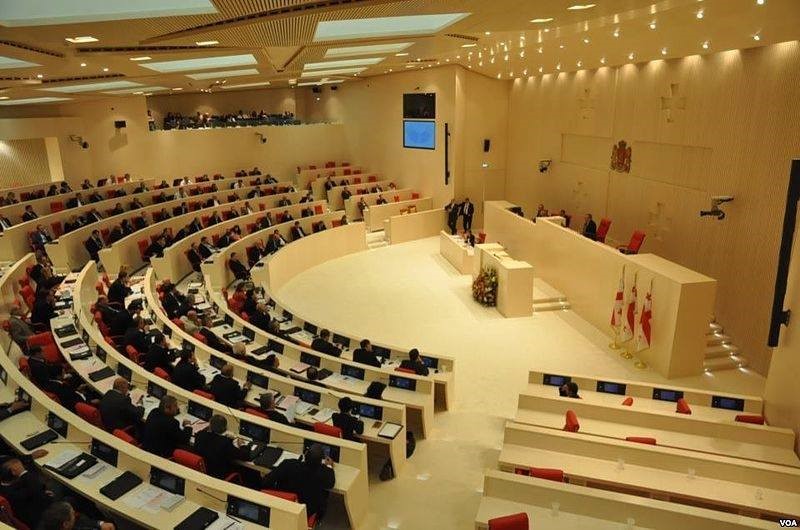


 Author: Natalia Varazi
Author: Natalia Varazi
On January 16, 2017, in accordance with Order #9/3 of the Chairperson of the Parliament of Georgia, a new composition of the Permanent Parliamentary Council on Open and Transparent Governance was approved.
The new composition of the Council is as followed: Irina Pruidze (Chairperson of the Council), Georgian Dream faction; Irakli Kobakhidze, Georgian Dream faction, Tamar Chugoshvili, Georgian Dream faction; Giorgi Kakhiani, Georgian Dream faction; Kakhaber Kuchava, Georgian Dream faction; Guguli Magradze, Georgian Dream faction; Giorgi Tughushi, European Georgia – for Better Future faction; Otar Kakhidze, European Georgia – for Better Future faction; and Emzar Kvitsiani, Patriots of Georgia faction.
Furthermore, on March 2, 2017, in accordance with Order #63/3 of the Chairperson of the Parliament of Georgia, Oder #9/3 of the Chairperson of the Parliament of Georgia “On Creation of the Permanent Parliamentary Council on Open and Transparent Governance” dated January 16, 2017, was amended and Tinatin Bokuchava, the United National Movement faction was added to the composition of the newly elected Council.In addition, on April 27 of the same year, the Order #9/3 was amended by the Order #147/3 of the Chairperson of the Parliament of Georgia and Eka Beselia, Georgian Dream Faction, was added to the composition of the Council.
The Permanent Parliamentary Council on Open and Transparent Government was first established on December 30, 2015. The commitment of its establishment was part of the Open Parliament Action Plan of Georgia (2015-2016) and was implemented as a result of the initiative by Institute for Development of Freedom of Information (IDFI).
The legal base for establishing the Parliamentary Council was enacted in the Parliament’s Rules of Procedure on December 18, 2015, when the Parliament of Georgia adopted the amendments to the Parliament’s Rules of Procedure on the third hearing – 76 in favor, none opposed. According to the amendment (Article 107 (23) (the number correlates with the Georgian alphabet)) the Chairperson of the Parliament of Georgia is obliged to create the Parliamentary Council in order to ensure transparency of the legislative activities, and coordinative and effective management of issues related to the openness of the Parliament.
The statute and the rules for composition of the Permanent Parliamentary Council on Open and Transparent Governance are adopted through the order of the Chairperson of the Parliament (Rules of Procedure of the Parliament of Georgia, Article 2831). The primary purpose of the Council is to ensure transparency of Parliamentary activities and elaborate and monitor implementation of the Action Plan of the Parliament of Georgia within the framework of the Open Government Partnership (OGP).
In accordance with Part 2 of Article 2831,the Council is composed of representatives of each faction, as well as of members of Parliament that are not affiliated with any faction. Candidate for the Council membership is presented to the Chairperson of the Parliament in writing by the chairperson of a faction. Members of the Parliament that are not part of any faction present candidates for the Council membership to the Chairperson in writing, on the basis of mutual consent. Furthermore, factions that are united in minority and majority can concede their quotas within the Council.
The initiative to establish the Permanent Parliamentary Council on Open and Transparent Governance belongs to the Institute for Development of Freedom of Information (IDFI). The latter is currently implementing a program titled Strengthening the System of Parliamentary Democracy in Georgia, which is funded by the United Nations Development Programme (UNDP) and the European Union.
In addition to the Parliamentary Council, a Consultative Group was also established within the framework of the Open Parliament Action Plan of Georgia 2015-2016. The Consultative Group is composed of representatives of non-governmental and international organizations and aims to assist the Parliamentary Council in implementing and monitoring the Action Plan.
The Consultative Group consists of: Institute for Development of Freedom of Information (IDFI), National Democratic Institute (NDI), United Nations Development Programme (UNDP), United States Agency for International Development (USAID), Transparency International Georgia, Georgian Young Lawyers Association, Open Society Georgia Foundation, Civil Society Institute, German Federal Enterprise for International Cooperation, Civil Society National Platform for the Eastern Partnership, Civil Development Institute, Council of Europe, the Economic Research Policy Center and JumpStart Georgia.